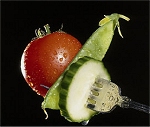Lower Fat Means Higher Carbs
 Over the last thirty years, food nutritionists and
the food industry as a whole have embraced the idea
of lowering our fat intake. This was a direct result
of the information published by the government that
encouraged less egg consumption because of the cholesterol
found in eggs. After that particular piece of information,
doctors began to discover that when we consume fat,
we have higher incidences of cholesterol problems. The
logical conclusion: fat must be bad for you. And so,
an entire generation has grown up with fat-free foods.
A whole generation grew up believing that fat was what
made us fat, clogged our arteries, and generally caused
ill-health.
Over the last thirty years, food nutritionists and
the food industry as a whole have embraced the idea
of lowering our fat intake. This was a direct result
of the information published by the government that
encouraged less egg consumption because of the cholesterol
found in eggs. After that particular piece of information,
doctors began to discover that when we consume fat,
we have higher incidences of cholesterol problems. The
logical conclusion: fat must be bad for you. And so,
an entire generation has grown up with fat-free foods.
A whole generation grew up believing that fat was what
made us fat, clogged our arteries, and generally caused
ill-health.
We could not have been
further from the truth. As it turns out, fat is a
necessary part of our metabolic processes. We need the
fat in order to properly utilize many of the vitamins
and nutrients we consume. Some of the fat that our
bodies produce protects us from sickness and disease,
and some forms of fat that we produce are necessary for
our organs to function correctly. Many of the
carbohydrates that we artificially inject into food
become stored fat that creates obesity.
 Now, what many of you do not realize is that fat flavors
our foods, when you remove the fat; you remove much
of the good taste. So what did we do? We turned to carbs
to make up for the loss in taste in the food. When you
remove the fat, the taste must be artificially injected
into the food. The end result is a food that is higher
in carbohydrate content, but lower in fat. Hence, all
the wonderful labels displaying the claim of “fat
free” but neglect to mention the higher level
of carbohydrates. Lowered fat should have
created a population of slim, trim, healthy people.
Now, what many of you do not realize is that fat flavors
our foods, when you remove the fat; you remove much
of the good taste. So what did we do? We turned to carbs
to make up for the loss in taste in the food. When you
remove the fat, the taste must be artificially injected
into the food. The end result is a food that is higher
in carbohydrate content, but lower in fat. Hence, all
the wonderful labels displaying the claim of “fat
free” but neglect to mention the higher level
of carbohydrates. Lowered fat should have
created a population of slim, trim, healthy people.
So what is the trade off
for foods higher in carbohydrates? Well, part of the
trade off is that carbohydrates turn into sugar fast
during the digestive process. What happens when sugar
levels become too high too fast? Diabetes would be the
number one bad effect. Others can include insulin
related problems with the pancreas, and hyperactivity in
young and old. Diabetes has been on the
rise for the last twenty-five years, and can probably be
traced directly to our increased level of carbohydrate
intake.
Healthy Carbohydrates
Carbohydrates, are an
important part of a healthy diet. Carbohydrates provide
the body with the fuel it needs for physical activity
and for proper organ function. The best sources of
carbohydrates - fruits, vegetables, brown rice and whole
grains - deliver essential vitamins, minerals, and
fiber.
Now, more in-depth research has revealed that maybe
it wasn’t the fat that created the cholesterol
levels that were out of control. Maybe it was a combination
of lifestyle and food habits that created dangerous
levels of cholesterol. The startling discovery that
there are two kinds of cholesterol: HDL and LDL.
There are certain kinds of fat that contribute to the
overall health of our arteries, not to their
detriment. How could we have been so wrong? Because,
just as many times before, the doctors performing these
tests, found what they wanted to find, not necessarily
the truth. Further testing could have produced the same
results in the beginning that they produced in the end.
Now, we have a whole food industry formed around low
or no-fat food alternatives. These companies have large
amounts of money invested in the production of these
foods, and is not going to be able or willing to turn
around on a dime. It’s because of corporate investment
that current knowledge about the “good”
fat has been suppressed as long as it has. It is a very
expensive piece of knowledge that is being passed on
to the public today. So expensive, that some companies
would be out of business were they to try and reverse
their food processing.
When you combine the fact that food lobbyists and pharmaceutical
lobbyists are two of the largest lobby groups in existence,
it is astonishment that this news ever made it to the
general public. But it has, and it will continue to
be a source of research and concern as many of the baby
boomers continue to age and experience health problems
thanks to the high levels of carbohydrate consumption.
Lower fat was not the
answer many thought it to be. As it turns out, we would
have been much better off to have left our food as it
was, and spent billions of dollars in the exercise
industry.
Good Fats/Oils
 Fat
has an undeserved reputation as a diet food that is bad
for weight loss and health. True, saturated
fat is bad for health, as it is proven to clog arteries
causing heart disease and stroke. The truth is, good fat
is absolutely essential for good health. Non-saturated
fat, including both
polyunsaturated and monounsaturated is the best for good
health.
Fat
has an undeserved reputation as a diet food that is bad
for weight loss and health. True, saturated
fat is bad for health, as it is proven to clog arteries
causing heart disease and stroke. The truth is, good fat
is absolutely essential for good health. Non-saturated
fat, including both
polyunsaturated and monounsaturated is the best for good
health.
Good fats/oils come from UNREFINED vegetable sources,
like flax oil, canola oil, soy oil, extra virgin olive
oil, wheatgerm oil, walnut oil, hemp seed oil, sunflower
oil and peanut oil.
Flax seed oil, hemp seed oil, canola oil and oily fish
are great sources of one of the key essential fatty
acids - omega-3.
Eating regular helpings of oily fish like salmon,
mackerel, sardines, tuna is also a good source of
omega-3's.
.

